Related Research Articles

Guinea-Bissau, officially the Republic of Guinea-Bissau, is a country in West Africa that covers 36,125 square kilometres (13,948 sq mi) with an estimated population of 2,026,778. It borders Senegal to its north and Guinea to its southeast.
The region now known as Guinea-Bissau has been inhabited for thousands of years. In the 13th century, it became a province of the Mali Empire that later became independent as the Empire of Kaabu. The region was claimed by Portugal beginning in the 1450s. During most of this period, Portuguese control of the region was limited to a number of forts along the coast. Portugal gained full control of the mainland after the pacification campaigns of 1912–15. The offshore Bijago islands were not colonised until 1936. After independence in 1974, the country was controlled by a single-party system until 1991. The introduction of multi-party politics in 1991, brought the first multi-party elections in 1994. A civil war broke out from 1998 to 1999.
Telecommunications in Guinea-Bissau include radio, television, fixed and mobile telephones, and the Internet.

The Revolutionary Armed Forces of the People is the national military of Guinea-Bissau. It consists of an army, a navy, an air force, and paramilitary forces. The World Bank estimated that there were around 4,000 personnel in the armed forces. The estimated military expenditure are $23.3 million, and military spending as a percentage of GDP is 1.7%.

Bissau is the capital and largest city of Guinea-Bissau. As of 2015, it had a population of 492,004. Bissau is located on the Geba River estuary, off the Atlantic Ocean, and is Guinea-Bissau's largest city, major port, its administrative and military centre.

The Republic of Guinea-Bissau follows a nonaligned foreign policy and seeks friendly and cooperative relations with a wide variety of states and organizations. France, Portugal, Angola, Brazil, Egypt, Nigeria, Libya, Cuba, the Palestine Liberation Organization, Ghana, and Russia have diplomatic offices in Bissau.
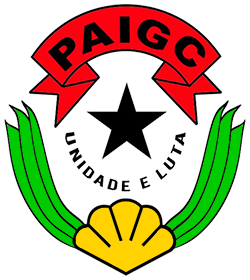
The African Party for the Independence of Guinea and Cape Verde is a political party in Guinea-Bissau. Originally formed to peacefully campaign for independence from Portugal, the party turned to armed conflict in the 1960s and was one of the belligerents in the Guinea-Bissau War of Independence. Towards the end of the war, the party established a socialist one-party state, which remained intact until multi-party democracy was introduced in the early 1990s. Although the party won the first multi-party elections in 1994, it was removed from power in the 1999–2000 elections. However, it returned to office after winning parliamentary elections in 2004 and presidential elections in 2005, since which it has remained the largest party in the National People's Assembly.

João Bernardo "Nino" Vieira was a politician who served as President of Guinea-Bissau from 1980 to 1999, except for a three-day period in May 1984, and from 2005 until his assassination in 2009.
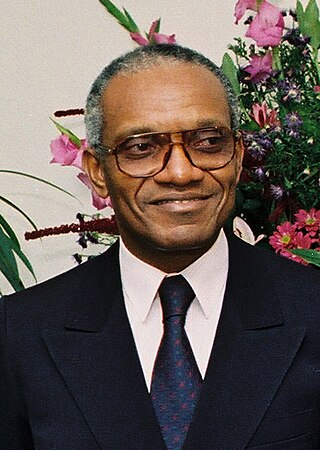
Miguel dos Anjos da Cunha Lisboa Trovoada was the prime minister from 1975 to 1979 and second president of São Tomé and Príncipe 1991 to 2001. On 16 July 2014, he was appointed the Special Representative of the United Nations Secretary-General and Head of the United Nations Integrated Peacebuilding Office in Guinea-Bissau (UNIOGBIS). Prior to this, he was the executive secretary of the Gulf of Guinea Commission.
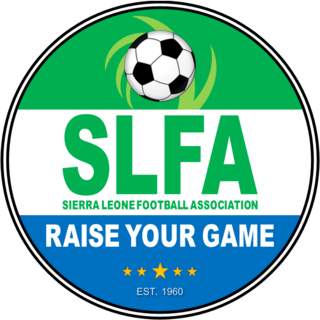
The Sierra Leone national football team represents Sierra Leone in association football and is governed by the Sierra Leone Football Association. It has qualified for Africa Cup of Nations three times.
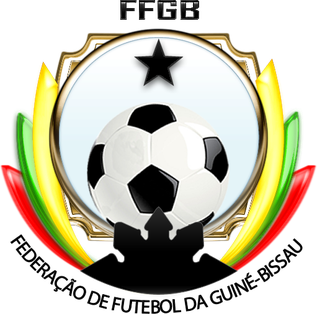
The Guinea-Bissau national football team represents Guinea-Bissau in men's international association football and it is controlled by the Football Federation of Guinea-Bissau, The team has never qualified for the FIFA World Cups but qualified for the Africa Cup of Nations four times, making their debut in 2017. The team is a member of both FIFA and Confederation of African Football (CAF).

Presidential elections were held in Guinea-Bissau on 18 March 2012 following the death of President Malam Bacai Sanhá on 9 January. A run-off was set to be held on 29 April after being postponed by a week as announced by electoral commission chief Desejado Lima Dacosta. However, after a military coup, the leading candidates were arrested and the election was cancelled. The junta's spokesman then announced plans to hold an election in two years, despite condemnation. General elections were subsequently held in April 2014.

The Guinea-Bissau women's national football team represents Guinea-Bissau in international women's football. It is governed by the Football Federation of Guinea-Bissau. It has played in two FIFA-recognised matches, both in 2006 against Guinea. The country also has a national under-17 side which participated in the 2012 Confederation of African Football qualifiers for the FIFA U-17 Women's World Cup. Football is the most popular women's sport in the country. A women's football programme was established in 2004, followed by the creation of a women's national league.
Prostitution in Guinea-Bissau is common and there are no prostitution laws. In 2016 it was estimated there were 3,138 prostitutes in the country. Often it is associated with other crimes: Many pimps are also reported to be drug dealers. Poverty leads many women to be tempted into prostitution and cocaine addiction.

Guinea-Bissau competed at the 2016 Summer Paralympics in Rio de Janeiro, Brazil, from 7 September to 18 September 2016.

Umaro Mokhtar Sissoco Embaló is a Bissau-Guinean politician serving as the president of Guinea-Bissau since February 2020. He is a political scientist and military officer who previously served as prime minister between November 2016 and January 2018.
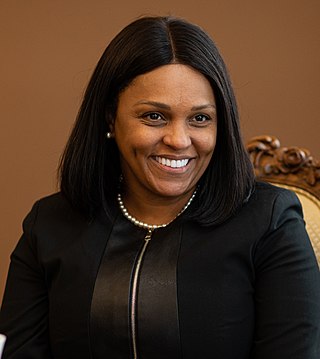
Suzi Carla Barbosa is a Bissau-Guinean politician, member of parliament and coordinator of the Committee of Women Parliamentarians of Guinea-Bissau.
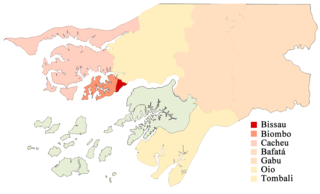
The COVID-19 pandemic in Guinea-Bissau is part of the worldwide pandemic of coronavirus disease 2019 caused by severe acute respiratory syndrome coronavirus 2. The virus was confirmed to have reached Guinea-Bissau in March 2020.
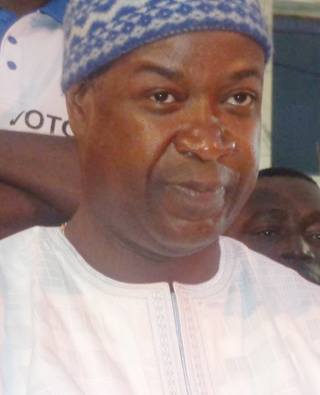
Nuno Gomes Nabiam is a Bissau-Guinean politician who served as the Prime Minister of Guinea-Bissau from 28 February 2020 to 8 August 2023.

Bissau-Guinean nationality law is regulated by the Constitution of Guinea-Bissau, as amended; the Bissau-Guinean Nationality Regulation, and its revisions; and various international agreements to which the country is a signatory. These laws determine who is, or is eligible to be, a national of Guinea-Bissau. The legal means to acquire nationality, formal legal membership in a nation, differ from the domestic relationship of rights and obligations between a national and the nation, known as citizenship. Nationality describes the relationship of an individual to the state under international law, whereas citizenship is the domestic relationship of an individual within the nation. Bissau-Guinean nationality is typically obtained under the principle of jus soli, i.e. by birth in Guinea-Bissau, or jus sanguinis, i.e. by birth in Guinea-Bissau or abroad to parents with Bissau-Guinean nationality. It can be granted to persons with an affiliation to the country, or to a permanent resident who has lived in the country for a given period of time through naturalization.
References
- ↑ "Closure of UNIOGBIS". UNIOGBIS. 8 December 2015. Retrieved 22 September 2023.
- ↑ "Launch of database of persons with disabilities in Guinea-Bissau". UNDP. 9 August 2021. Retrieved 22 September 2023.